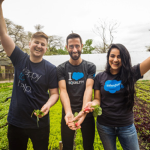#BreakTheBias was the theme of International Women’s Day 2022, but gender equality extends far beyond a single day. There are a multitude of ways a company can help break biases surrounding gender inequality, women in tech, and women in leadership positions seven days a week, three hundred and sixty-five days a year.
I caught up with some inspiring leaders to talk about what they think companies are doing to play their part in this movement, and what can still be done by organisations like Salesforce.
Samantha Whitmore (RVP Sales TTH UKI)

I haven’t always felt like I could be myself as a woman in the tech world. I was the only woman in many teams. I tried to fit the mould of what I thought people wanted: be pretty, be one of the boys, be charming, be less funny, be less emotional, be quiet. It was exhausting trying to keep that up. When you just stop hiding behind a mask, it is not only liberating, but you realise it is essential to being a good leader.
Trust has its roots in authenticity – people can’t completely trust you if they don’t believe you. I think part of that responsibility to encourage employees to embrace authenticity at work is down to company culture. At Salesforce I am very fortunate that I can be myself and in doing that, I have advanced in my career. My advice to help #BreakTheBias is to be brave. It can be daunting of course, but if you put your true authentic self out there, the payback for you, your teams and your company will be huge.
Rebecca Komodikis (Senior Success Manager)

Retaining women in the workplace and providing opportunities where they can grow and develop into leadership positions is critical in breaking the bias, not only at Salesforce but in the technology industry as a whole. I believe ending gender bias in tech is the responsibility of the organisation itself, and not the individual.
Salesforce provides opportunities for women and underrepresented groups to have a voice via their Employee Resource Groups (ERGs). Within my role as co-chair of Salesforce Women’s Network UK for Policy, I partner with our Employee Success team to solicit feedback from our employee population and work together to constantly push the boundaries of what we know and offer to strive for an even better workplace.
Salesforce as an organisation takes responsibility for breaking the bias by embedding gender equality into their culture and policies by providing generous parental leave, flexible working, and leadership training. It’s with these policies – which are part of our DNA – that we hope to educate our employees, #BreakTheBias and in turn, improve the experience of women in the workplace at Salesforce.
Jasita Lalloo (Regional Sales Director)

No company is perfect, but with that said, at Salesforce I can see that there is significant effort being made across the board from the top down to help break the bias surrounding gender equality.
There are so many things organisations can do to help make significant progress in this area and accelerate real change.
Companies should allow women to show vulnerability without judgement, to help promote authenticity and bring their ‘true self’ to work. Flexibility and support are hugely important for females in all positions, regardless of level or department.
It’s also important to promote the fact that they are brilliant at their jobs, and not just that they are women doing a good job. Oftentimes we specifically call them out as ‘female’ or ‘women’ leaders. They should merely be called ‘leaders’, like their male counterparts. These are small changes, but they can be powerful. On a higher level, companies should strive for gender balance across senior leadership, which I think Salesforce are quite good at and I’m very fortunate to be able to work for a company that has been recognised as a great place to work for women.
Alice Steels (Regional Sales Director FinServ UKI, Tableau)

Salesforce is doing its part in a BIG way to make women feel like their careers are important; if not more so when returning to work after maternity leave.
The benefits Salesforce provide when on maternity leave are like no other company I’ve ever experienced. I also had full access to my other employee benefits including my wellbeing allowance and was still made to feel very much part of the team.
I took 12 months off, as I really wanted to enjoy getting to know my baby and myself as a new mum. I always knew I wanted to return to work and focus on my career so it felt right to take a year out.
Salesforce could not have made me feel more valued when returning to work from maternity leave. I always knew I may want to move into a more senior role but never thought it would be possible to be promoted whilst on maternity leave. I moved into a regional sales director role for the financial services team in the UKI in February whilst on mat leave and came back to work in June! I have heard many similar stories from fellow parents returning to work at Salesforce and the support we have is truly the best I have ever experienced.
Rachel Bowes (Lead Solution Engineer, Tableau)

Salesforce supported me tremendously with my pregnancy; before, during and afterwards. During maternity leave, I really valued the benefits made available to us through Salesforce, particularly having access to an app called Cleo – which contained my very own personal guide (Lina) to help me through the first year with a newborn. We shared video chats where she answered any questions or concerns, set up sessions with both a lactation consultant and a sleep consultant, and even provided advice in an emergency situation I had. It couldn’t have been a more positive experience.
After being away for a year on mat leave, it felt very daunting to return to work. I was battling with a loss of confidence and trying to figure out the right balance between my work responsibilities and my new responsibilities as a mum. Having supportive colleagues, access to great sessions set up by the Salesforce Women’s Network in Ireland and even a Slack channel set up to connect Tableau mums has been very helpful and comforting and I feel incredibly grateful for what my employer offers me. It’s definitely a standard I would like to see rolled out across the industry.
Denise Wyer (RVP, Start Ups Ireland)

International Women’s Day is a wonderful opportunity to recognise and celebrate the incredible achievements of women around us. I’m extremely proud to be part of a company that does the work to create a more equal workforce all year round. A great example of the impactful work Salesforce is doing is offering paid maternity and paternity leave to their employees, breaking the bias of childcare responsibility. This has never been more relevant when we consider that women have been disproportionately impacted by the pandemic due to the unequal responsibility of unpaid child care.
Businesses need to put the structures in place to help create an equal workforce and each person within that business can help. As leaders in the business, one of the most impactful things we can do is to create a culture that promotes equal and transparent opportunity, mentorship and advocacy for everyone.
Ensuring that both the women and men within our teams have access to mentors who will help support their skills and career development and will advocate for them is crucial. I’ve had wonderful female and male mentors and advocates who have helped me progress my career and I’m extremely passionate about the impact mentors can have. Creating a culture of equality comes down to both women and allies, but also to the organisations that employ them and I’m grateful to work for a company that holds equality to such a high standard.
Chloë Carton (Enterprise Account Manager)

In my mind, the most important thing a company can do to help #BreakTheBias surrounding gender and minority group inequality is to simply make a start. Recognise the issues and the ‘why’ behind them. How did we get here? And what’s the benefit of evolving? Time and time again, research has found that a diverse workforce leads to greater creativity, efficiency, productivity, a broader range of skills and perspectives, and an improved cultural awareness; all aiding an organisation’s KPIs.
Preconceived judgements must be broken down, and in their place, we must create a space for learning, action and open communication. Unconscious bias is a real thing which takes effort and self-awareness to avoid. There is no “I’ll start on Monday”. This practice must start, and begin again every single day.
We must refuse to accept that having a diverse workforce is difficult, and unachievable. Sponsorship of gender equality coming from the top is important, but it’s also everyone’s responsibility and needs to be ingrained into the vision of the company. Employees should be trained on their unconscious biases. Yes, self-reflection can be uncomfortable, but change comes from being uncomfortable, and the end goal will be worth it.
The phrase “the whole is so much greater than the sum of the parts” is absolutely relevant when driving diverse teams and we can #BreakTheBias when we bring together diverse perspectives to contribute and learn. In doing so, organisations will attract top talent and retain happy and motivated employees, who, feeling that their voice counts; will speak up and share their ideas.
Yes, it will shape the workplace of tomorrow, but ultimately it’s just the right thing to do.
To learn more about Salesforce’s commitment to equality, check out our website and to see the open positions at Salesforce, check out our European Careers Site.




















